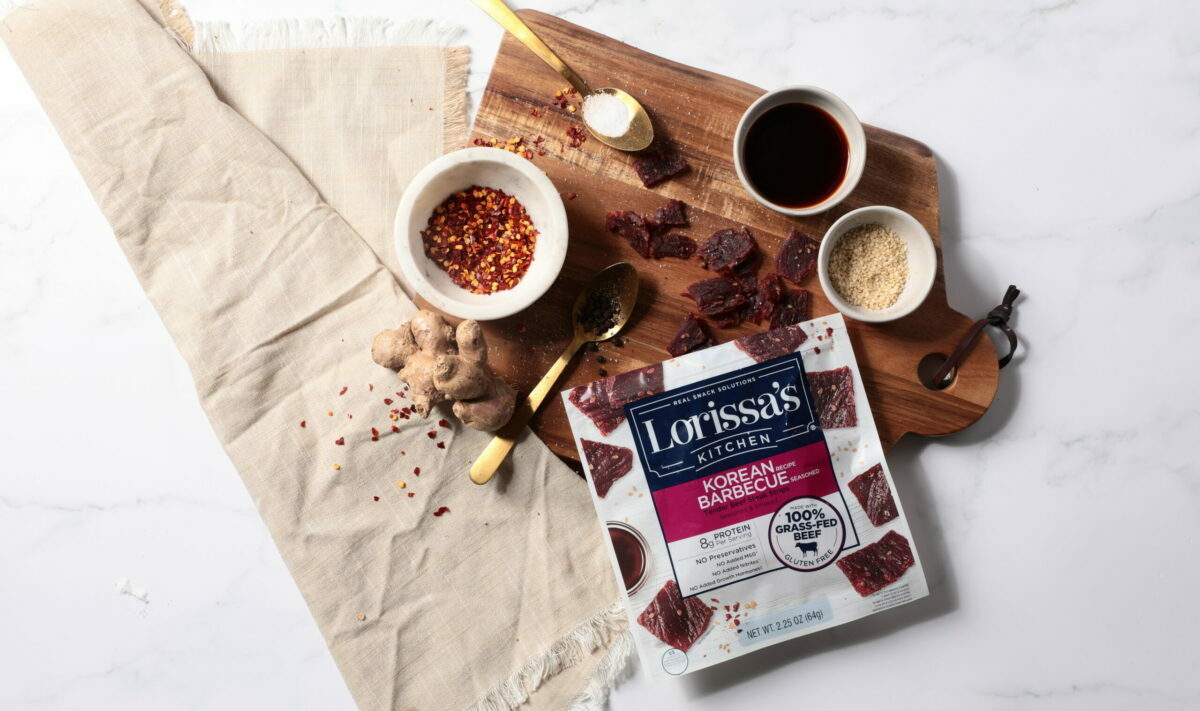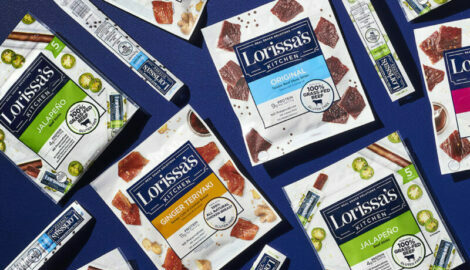

Beef jerky is a convenient, portable snack that can help fuel you and leave you feeling satisfied. Beef jerky is also a good source of protein, but how much protein is in jerky really? And why is it so important that we eat protein every day? Let’s answer both questions and explore what to look for when choosing any meat snack.
Why Do You Need Protein Every Day?
Proteins are molecules that are essential to our bodies. They’re heavily involved in all the functions of our cells, with each protein having a special part to play. Proteins make up substances that you might recognize, such as enzymes, hormonal proteins and antibodies.
Proteins do a lot of work in each of our cells and are responsible for helping with important tasks, such as:
- Producing energy
- Forming antibodies
- Growing and maintaining tissue
- Making your digestive system work
- Creating hormones
- Regulating acids and bases in your body
You need protein to repair cells and make new ones throughout the day, which is why it’s so important to eat protein every day.
What Happens When You Don’t Eat Enough Protein?
According to the FDA, most Americans get enough protein to meet their dietary needs. However, it’s important to ensure you eat the recommended amount of protein to help prevent a deficiency.
Protein deficiency can lead to a range of problems, and it’s no wonder why—without protein, your body will struggle to perform the essential functions you need to live a vibrant life. People can develop a range of problems when protein is absent from your diet.
Hunger
Protein is your fuel, along with carbs and fat. Protein can also help you feel full for longer than fibers and fats.
Muscle Loss
Protein helps to promote muscle growth and maintain muscle mass. For those who live an active lifestyle, you need protein to help rebuild any microscopic muscle tears that come from exercise.
But that’s not all—if you’re not feeding your body enough protein, your body will break down your skeletal muscles to retrieve it, leading to muscle loss.
Prone to Illness
Protein helps to produce antibodies that can fight sickness and promote healthy cell growth. It’s an important part of our immune system to help us stay healthy.
Brittle Hair, Skin and Nails
Getting the right amount of protein in your daily diet is important in maintaining strong hair, skin and nails. This is especially important for your hair, which is primarily made of protein.
How Much Protein Is Recommended Daily?
Everyone needs different amounts of protein—it all depends on your height, weight, sex, your daily calories and activity level.
There are a few different ways to figure out your recommended daily protein intake. You can use this handy calculator by the United States Department of Agriculture (USDA) to figure out your needed daily protein and calories.
Another way is to follow the USDA’s Dietary Guidelines for Americans for recommended protein intake:
- Females aged 9-13 with a 1600 calorie diet: 34 grams
- Females aged 14-18 with an 1800 calorie diet: 46 grams
- Females aged 19-30 with a 2,000 calorie diet: 46 grams
- Females aged 31-50 with an 1800 calorie diet: 46 grams
- Females aged 51+ with a 1600 calorie diet: 46 grams
- Males aged 9-13 with an 1800 calorie diet: 34 grams
- Males aged 14-18 with a 2200 calorie diet: 52 grams
- Males aged 19-30 with a 2400 calorie diet: 56 grams
- Males aged 31-50 with a 2200 calorie diet: 56 grams
- Males aged 51+ with a 2000 calorie diet: 56 grams
Can Beef Jerky Help You Reach Your Nutrition Goals?
First, not all beef jerky has the same nutritional value. It’s important to know what to look for when choosing a quality beef jerky to assist your daily nutrition.
Protein and Fat Content
Beef jerky and other meat snacks are a good source of protein. Flip over the package of any beef jerky and check out its nutrition facts. Some may range between 7-10 grams of protein or more per serving. For example, our beef steak strips have 10 grams of protein per serving.
You can also look over the fat content of your jerky. Healthy fats help to reduce inflammation in our bodies, but different kinds of fat are better than others.
For instance, saturated fats are found naturally in meat products, but too much can put you at risk for heart disease. Trans fats are often artificially produced to give foods a certain taste and texture, but raise cholesterol levels. In our beef steak strips, there are zero trans fats and only 0.5 grams of saturated fats per serving.
Grass-Fed vs Grain-Fed Beef
The first thing to know is the type of beef that’s used for your jerky. Grass-fed beef tends to have higher nutrient content than grain-fed beef. That’s because grass-fed cows eat a cleaner, more natural diet than grain-fed cows, which are fed corn and grain.
Grass-fed cows also get to roam on pastures, whereas grain-fed cows are kept in close quarters in feedlots. These differences combined affect the wholesome fat content of the beef, the leanness of the meat and the overall taste.
Added Nitrites, Nitrates and Preservatives
Nitrites and nitrates occur naturally in our bodies and can be found in some foods. However, added nitrates and nitrites that are not naturally occurring can be risky and can be linked to adverse reactions in the body.
Lorissa’s Kitchen Beef Strips Nutrition Facts
If you don’t have your hands on one of our packages of tasty beef steak snacks, never fear—we’ll break down the nutrition facts for you right now. Let’s look at our most popular items.
Organic Original Beef Steak Strips
- Servings per container: 2.5
- Serving size: 1 ounce or 28 grams
- Calories per serving: 80
- Total Fat: 2 grams
- Protein: 10 grams
- Total carbs: 6 grams
- Sodium: 250 milligrams
- Cholesterol: 25 milligrams
- Calcium: 10 milligrams
- Potassium: 170 milligrams
- Iron: 0.9 milligrams
Organic Teriyaki Beef Steak Strips
- Servings per container: 2.5
- Serving size: 1 ounce or 28 grams
- Calories per serving: 80
- Total Fat: 1.5 grams
- Protein: 9 grams
- Total carbs: 7 grams
- Sodium: 440 milligrams
- Cholesterol: 25 milligrams
- Calcium: 10 milligrams
- Potassium: 160 milligrams
- Iron: 0.9 milligrams
Korean Barbecue Beef Steak Strips
- Servings per container: 2.5
- Serving size: 1 ounce or 28 grams
- Calories per serving: 80
- Total Fat: 2.5 grams
- Protein: 8 grams
- Total carbs: 7 grams
- Sodium: 430 milligrams
- Cholesterol: 15 milligrams
- Calcium: 10 milligrams
- Potassium: 140 milligrams
- Iron: 0.8 milligrams
Chicken Nutrition Facts
If beef isn’t your thing, that’s okay! You still can enjoy scrumptious jerky with our chicken meat snacks. Here are the nutrition facts for our Ginger Teriyaki Chicken Breast Cuts:
- Servings per container: 2.5
- Serving size: 1 ounce or 28 grams
- Calories per serving: 80
- Total Fat: 1.5 grams
- Protein: 11 grams
- Total carbs: 5 grams
- Sodium: 380 milligrams
- Cholesterol: 35 milligrams
- Calcium: 10 milligrams
- Potassium: 180 milligrams
- Iron: 0.2 milligrams
Enjoy Lorissa’s Kitchen Meat Snacks for Quick Protein
It’s truly possible to eat something both delicious and wholesome at the same time. Our beef steak strips, cuts and sticks are made with high-quality ingredients and can help boost your energy when you’re out and about. Plus, they’re easy to pack in your work bag or child’s backpack for an effortless afternoon snack. Learn more by shopping our products today!
Lorissa’s Kitchen does not provide medical advice, diagnosis, or treatment. Any information published on this website or by this brand is not intended as a substitute for medical advice, and you should not take any action before consulting with a healthcare professional.

